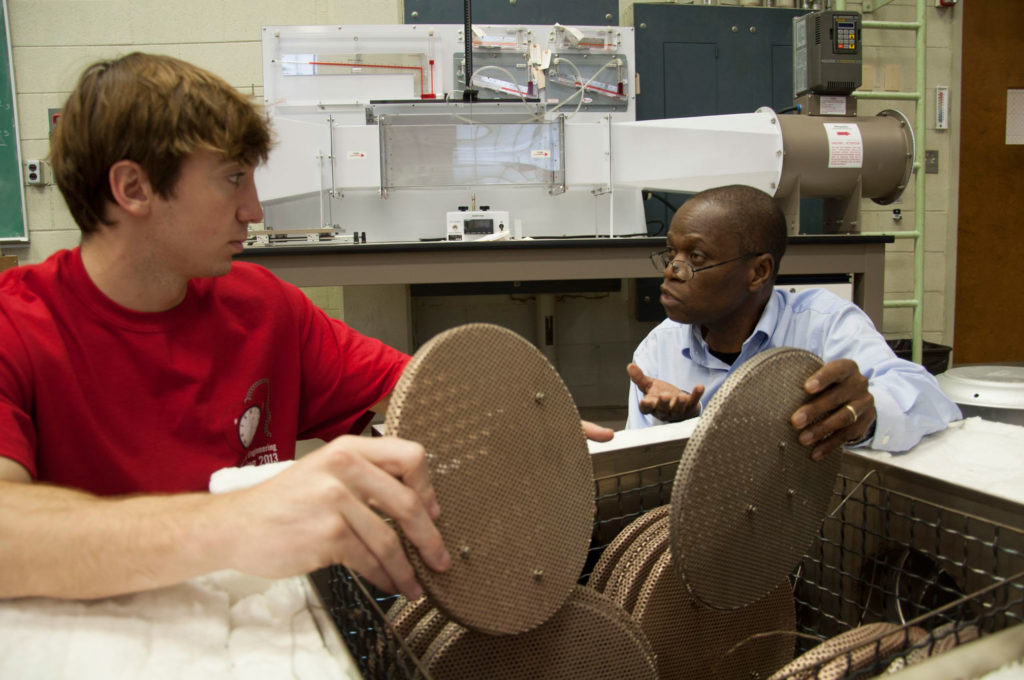Athens, Ga. – Keeping milk safe and healthy to drink is a challenge in areas without electricity. A University of Georgia engineer received $1 million to continue working on a milk cooler designed to help dairy farmers, particularly those in sub-Saharan Africa, who lack access to refrigeration.
The milk cooler, developed by William Kisaalita, professor of biological and mechanical engineering in the UGA College of Engineering, uses the principle of evaporative cooling to quickly bring the temperature of milk to a safe holding temperature.
“It’s the same phenomenon that occurs when you jump into a swimming pool and then you come out on a windy day,” said Kisaalita. “If there’s water on your skin, you will feel cold. This same principle is applied in chilling the milk.”
Kisaalita recently received $1 million from the U.S. Agency for International Development in partnership with the Swedish Government, Duke Energy Corporation, the German Government and the Overseas Private Investment Corporation. Kisaalita’s was one of 12 international projects selected from 475 applications to share $13 million in funding under USAID’s Powering Agriculture: An Energy Grand Challenge for Development. The prize is awarded to projects that integrate clean energy technology into the agriculture sectors of developing countries.
“Powering Agriculture demonstrates how we can harness ingenuity and entrepreneurship to generate and scale real solutions in our fight to end extreme poverty,” said USAID administrator Rajiv Shah. “Joining a community of hundreds of innovators…these winning ideas prove that we can change the landscape of what is possible.”
Kisaalita developed a refrigeration unit using the principle of evaporative cooling powered by biogas. The biogas is produced through the collection of cow manure-an abundant resource on dairy farms. The milk cooler design includes a container of milk that is surrounded by water. A vacuum pump depressurizes the container and zeolite, an adsorption silicate, captures the evaporating water causing the temperature inside the cooler to drop. The milk is chilled and kept fresh overnight allowing farmers to sell their milk the next day. Current dairy farmers may lose as much as 50 percent of their daily milk due to inadequate cooling technology.
Working with farmers in rural Uganda, Kisaalita will refine the design of his cooler and work with local manufacturers to bring the cooler to these farmers.
“The social, economic and environmental benefits to this project are interrelated and will have a rippling effect,” said Kisaalita “The milk coolers will benefit dairy farmers by decreasing milk spoilage and increasing production and profits. Biogas, also used for lighting and cooking, will save income that otherwise would be spent on kerosene and will replace the use of charcoal and wood for cooking, which is shrinking in availability as Uganda’s forests are depleted. In addition, by extracting biogas from cow manure, greenhouse gas emission from fermenting cow dung is mitigated. Finally, there are health benefits for cooking with biogas-smoke from woody biomass causes respiratory problems for children.”
A native of Uganda, Kisaalita received his Ph.D. in chemical engineering from the University of British Columbia in Vancouver and a B.S. in mechanical engineering from Makerere University in Kampala, Uganda. He joined the faculty at UGA in 1991, and he has been involved in various research activities and international service-learning projects that have engaged undergraduate students in developing solutions to real-world problems. Along with his teaching and research responsibilities, he has served as the associate director of UGA’s Center for Undergraduate Research Opportunities, and he is a faculty mentor for students in the Peach State Louis Stokes Alliance for Minority Participation.
UGA College of Engineering
The University of Georgia College of Engineering is the country’s newest engineering school at the oldest state-chartered university. Offering a fundamental yet comprehensive and robust educational experience, the college prepares students to become successful, practicing engineering leaders, capable of working in complex arenas. For more information, see http://www.engr.uga.edu/.
